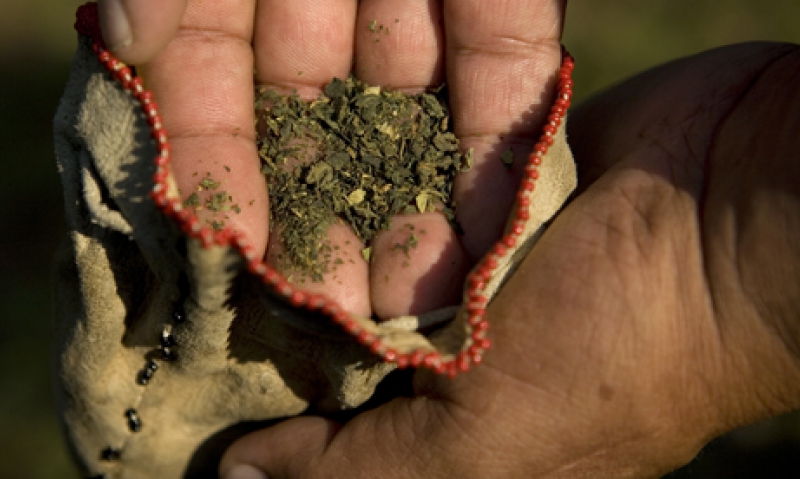
The fight for sacred tobacco
Over the years, several Native American servicemembers of the Ho-Chunk Nation in Wisconsin have had their sacred tobacco confiscated by military authorities. The tobacco is tested and determined to be perfectly legal, but it's almost never returned to its rightful owner.
Sacred tobacco is no different from crosses, rosaries, Bibles or any objects that are sacred to other religions, explains Wilfrid Cleveland, president of the Ho-Chunks. Most tribe members carry their tobacco with them - or keep it near them - in small leather pouches.
"From the beginning of time, we had our ceremonies and we were in unison with the Creator and the things around us," Cleveland says. "The harmony that we live in with Creation - part of it is our sacred ceremonies, and when our elders offer tobacco to the Great Spirit for safekeeping our young ones going off to war."
When Ho-Chunks join the armed forces, their sacred tobacco goes with them and they want the Department of Defense to stop taking it away.
Robert Mann is a veterans service officer for the Ho-Chunks and works closely with three American Legion posts in the area: 442, 556 and 129. Whenever a tribal member's tobacco is confiscated in boot camp, during personnel inspections or at customs checks, Mann usually becomes involved. He thinks that some DoD personnel have a hard time understanding the importance of sacred tobacco in the Ho-Chunk belief system.
"You'd have to compare it to something that's precious to you," Mann says. "Let's say you carry a Bible. This Bible means an awful lot to you, and you carry it at all times, and somebody walks up and says, ‘You can't have that,' and takes it away from you with no explanation."
Confiscation of sacred tobacco is especially irritating to the Ho-Chunks because their right to possess it has been protected by federal law since Aug. 11, 1978.
The American Indian Religious Freedom Act clearly protects tribal rights "to believe, express, and exercise" their traditional religions, including "access to sites, use and possession of sacred objects, and the freedom to worship through ceremonials and traditional rights."
Less than a month after that law was passed, Private First Class James Pettibone, USMC, had his sacred tobacco confiscated at Camp Lejeune, N.C. In a statement he recently wrote for the Ho-Chunk Nation's records, Pettibone explained his tobacco was taken "because it resembled an illicit drug." One question put to him at the time was, "Is this that wacky tobacco you smoke to go on the warpath?"
"Thirty-two years later," Pettibone wrote, "we are still dealing with wars that our sons and daughters have to contend with; 32 years later, our kids die and are still being stripped of their sacred tobacco pouches."
Among Ho-Chunks serving in the military, tobacco confiscation is infrequent but it happens often enough to remind the tribe that some members of our armed forces continue to violate federal law and remain ignorant about Native American beliefs.
Many Ho-Chunks have died in combat overseas, defending a country their ancestors once warred against. One of the tribe's fallen warriors, Corporal Mitchell Red Cloud, Jr., received the Medal of Honor for his brave actions in the Korean War on Nov. 5, 1950. Stationed on the point of a ridge right in front of his company's command post, Red Cloud was the first to face an onslaught of Chinese Communist troops charging from a brush-covered area less than 100 feet away.
When Corporal Red Cloud died for his country, his sacred tobacco was with him.
David Kurtz, adjutant of The American Legion's Department of Wisconsin, thinks the DoD "has to do a better job in teaching its own people that sacred tobacco is not marijuana or any other kind of controlled substance. It's got to be a priority of leadership to penetrate down to the drill instructors, to the NCO's, to get down to where the rubber meets the road and educate them," says Kurtz.
"The military has so many administrative procedures to deal with somebody who enlists with different medical needs, or if they have different religious beliefs. It's a question of willingness to accommodate these beliefs."
Editor's note: A feature story on "Sacred Tobacco" will appear in the February 2011 issue of The American Legion Magazine.
